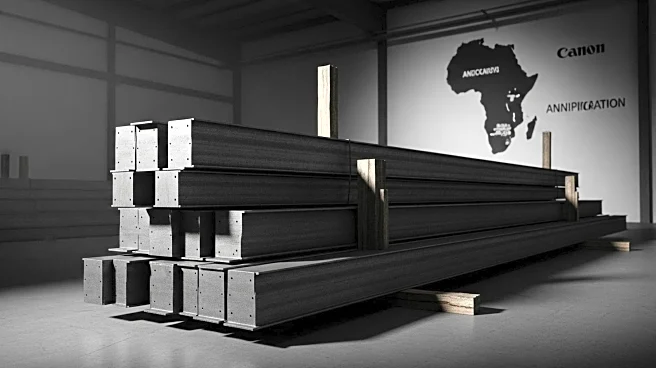What's Happening?
The European Union has announced a significant increase in steel import tariffs, doubling them to 50 percent in an effort to protect its struggling steel industry from global overproduction. While the new measures primarily target major steel producers like China, India, and Turkey, African exporters have been largely exempted due to their smaller share of EU steel imports. However, the continent may still face challenges as redirected steel from these major producers could flood African markets, potentially undercutting domestic industries. The EU's decision to slash tariff-free quotas aims to curb overproduction, but it also risks destabilizing global trade flows, with Africa's infrastructure boom and the African Continental Free Trade Area (AfCFTA) making the region an attractive target for surplus steel.
Why It's Important?
The EU's protectionist measures could have significant repercussions for Africa's industrial growth and economic stability. While exemptions provide temporary relief for African exporters, the influx of cheap steel could undermine local industries and slow down industrial development. This situation highlights the interconnectedness of global trade and the potential for policy decisions in one region to impact others. African countries must navigate these challenges to protect their domestic markets and sustain growth. The EU's actions also underscore the need for coordinated policy responses to manage the impact of redirected steel supplies and maintain the continent's industrial ambitions.
What's Next?
African nations may need to implement strategic measures to safeguard their domestic steel industries from the potential influx of cheap imports. This could involve strengthening trade policies and enhancing regional cooperation to mitigate the impact of global trade shifts. Industry leaders in countries like South Africa are urging their governments to act swiftly to protect local producers from intensified competition. The situation calls for proactive engagement with international trade partners to ensure Africa's industrial growth is not compromised by external market forces.
Beyond the Headlines
The EU's decision to tighten steel import rules reflects broader trends in global trade protectionism, which can have far-reaching implications for developing economies. Africa's experience highlights the challenges faced by emerging markets in balancing growth with external pressures. The situation also raises questions about the long-term sustainability of global trade practices and the need for equitable policies that support industrial development across regions. As Africa continues to develop its infrastructure and industrial capabilities, the continent must navigate complex trade dynamics to achieve sustainable growth.









